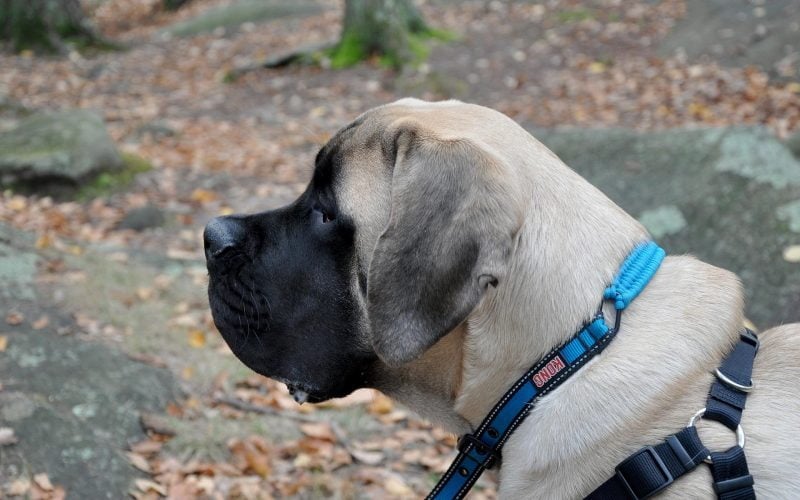
Quick Facts
Origin: England, but can trace lineage back to ancient Rome
Height: 27.5”-32”
Weight: 120-220lbs
Color: Apricot, Brindle and Fawn
Lifespan: 6-12 years
Temperament: Docile, alert, protective, strong, stubborn
The Good
Great with children
Natural guard dogs
The "Ruff"
Tendency to drool and snore
Prone to flatulence
Overview
While there are many breeds of mastiffs, there is only one that deserves the capital “M”. Mastiffs, sometimes called as Old English Mastiffs are known as gentle giants, with an emphasis on giant. An adult male pup can weigh more than an adult male human.
Mastiffs are known to be incredibly friendly and exceptional with children. They were originally bred as large game hunters. They have evolved into natural guard dogs with a penchant for keeping an intruder pinned or caught versus physically attacking.
Mastiffs need plenty of exercise and will do well in any sized home if they get it. Without a proper workout your pup may become destructive in your home. While they love to get their exercise outdoors, they are really homebodies that love the company of their family. They are known for their black masked muzzle.
Celebrity Owners
Kirstie Alley, Marlon Brando, Larry Wolfe, Michael Bay, Flea, Bob Dylan, Jon Bon Jovi, Dwayne “The Rock” Johnson, Vin Diesel
Fun Facts
- Mastiffs are descended from Molossus, ancient Roman war dogs.
- A Mastiff named Hercules, stars in the 1993 film The Sandlot. His massive size intimidates the young characters who need to retrieve a baseball signed by Babe Ruth from him.
- Living solely in England at the time, Mastiffs almost became extinct during WWII as only 14 of the bred survived the war.
- In 1989 a Mastiff named Zorba made the Guinness Book of World Records weighing in at 330lbs.
Health
The most common issue with Mastiffs is hip dysplasia. Other health issues can include congenial heart disease, gastric dilatation-volvulus, ectropion, persistent pupillary membranes, vaginal hyperplasia, elbow dysplasia, progressive retinal atrophy and cardiomyopathy.
While you always hope your pet will live a long and healthy life, it is always a good idea to invest in pet health insurance.
Grooming
With all that drool, one of the most important things with Mastiffs is to keep their facial folds dry to prevent skin irritation. While you are checking for drool, also check the rest of your pup’s face to make sure everything is dry and clean.
Mastiffs will shed their coat once or twice a year, requiring extra combing to remove dead hair. Through the rest of the year less frequent brushing will keep your pup looking top notch. As with all dogs, keep your pup’s nails clipped, regularly check their ears to make sure they are clean and clear of debris and brush their teeth several times a week.
Exercise
While your pup will require stimulation and exercise daily to remain calm and docile, Mastiffs are also known to easily overheat. Fully grown adults will be able to take daily walks that do not exceed 2 miles. Younger pups should avoid too much play or you may end up having to lug your “little one” home.
Training
Especially with large dogs, training and socializing in tantamount. Large dogs, even when considered docile need to respect that you are the alpha. In dangerous situations, you should always be certain your Mastiff will defer to you. Mastiffs can be stubborn and thus difficult to train and respond best if the training is gentle. Be mindful to curtail any jumping and leash pulling when your pup is growing because it may eventually outweigh you.
Nutrition
Mastiff puppies’ food need to be monitored and adjusted slowly as they grow. It is important to allow your dog to grow slowly into its adult size to avoid developing hip and elbow dysplasia.
Adult mastiffs should be fed 6-8 cups of nutritious food over several meals throughout the day. Gastric dilatation-volvulus (a condition caused by overeating or drinking making the stomach bloat cutting off crucial blood supply) is a concern in this breed, so breaking up the access to food is necessary.
Supplements
A solid Glucosamine Supplement for hips and joints will go a long way to helping your furry friend.
Other helpful supplements include full-spectrum helm oil or CBD oil. Fish oil skin and coat supplement.
